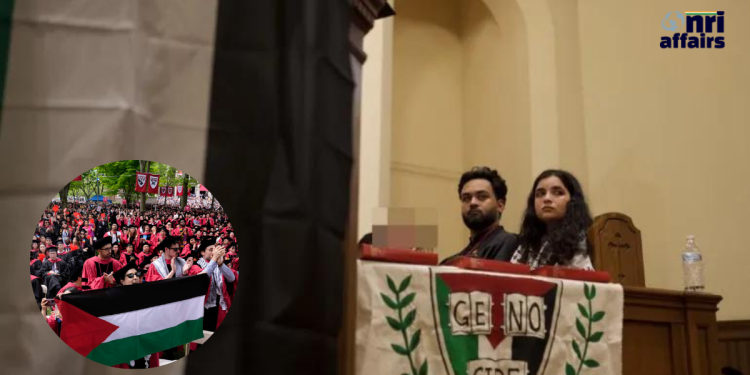A recent controversy has arisen at Harvard University, where graduating students who participated in a protest advocating for Palestine were denied their degrees. The incident has sparked debate and raised questions about freedom of expression on college campuses.
It has been over two weeks since Harvard University’s commencement ceremony for the class of 2024, yet Asmer Asrar Safi is still awaiting the degree he worked tirelessly for over four years to earn.
The Harvard Corporation, the university’s highest governing body, decided to withhold the degrees of these students during this year’s commencement ceremony on May 23 due to their involvement in a three-week pro-Palestine encampment at the university last month.
“I am currently awaiting the outcome of my appeals process,” says Safi, aged 23, an international student studying social studies and ethnicity, migration, and rights at Harvard College.
“As a Rhodes Scholar, I am exploring the possibility of matriculating at the University of Oxford. This is despite having fulfilled all academic requirements for my program and having completed my degree prerequisites, as my Harvard degree has been deferred for a year.”
Shraddha Joshi, another student facing the same dilemma, will also be unable to receive her degree, despite receiving support from her faculty at Harvard College, where she pursued the same program as Safi.
“After submitting my appeal application, we find ourselves in a state of uncertainty as we await communication from the university. Both students and faculty members are puzzled by the lack of clarity surrounding the appeals process, and the timeline remains unclear,” she says.
The issue of academic freedom and the right to protest has become a contentious topic at Harvard University, mirroring similar debates at academic institutions across the United States. This controversy has been exacerbated by Israel’s ongoing conflict in Gaza.
Claudine Gay, who held the position of Harvard’s president for only six months, stepped down from her role in January of this year. Her resignation followed her appearance at a congressional testimony focused on “rising anti-Semitism” on college campuses in December 2023.
In her resignation letter, Claudine Gay, Harvard’s first Black president and only the second woman to hold the position in its 388-year history, attributed her decision to step down to personal attacks fueled by racial animosity.
The pressure for Gay’s resignation intensified amid allegations of plagiarism regarding her academic work, which surfaced shortly after her appearance at the congressional hearing.
Meanwhile, in April, students at Columbia University, an Ivy League institution in New York, launched an encampment on campus grounds to protest against the Israeli military campaign in Gaza. Their demands included the university’s divestment from companies associated with or conducting business with Israel.
The nationwide protest movement quickly gained momentum, with encampments sprouting up at over 30 universities across the country, including Harvard, where student demonstrators launched their protest encampment on April 24.
Echoing similar demands at universities nationwide, the Harvard protesters called for full transparency regarding the university’s investments in companies associated with Israel and urged divestment from such entities.
Following negotiations between the university administration and the Harvard Out of Occupied Palestine (HOOP) coalition, the leading force behind the protest, the encampment was disbanded on May 14.
As part of the agreement to end the encampment, Harvard, which had placed more than 20 students on “involuntary leave,” committed to initiating the reinstatement process for these individuals and offered protesters a meeting with members of the university’s governing boards to discuss divestment.
Interim president Alan Garber stated on May 14, “With the disruption to the educational environment caused by the encampment now abated, I will ask that the schools promptly initiate applicable reinstatement proceedings for all individuals who have been placed on involuntary leaves of absence. I will also ask disciplinary boards within each school to evaluate expeditiously, according to their existing practices and precedents, the cases of those who participated in the encampment.”
The protesting students ultimately accepted this resolution and opted to dismantle the encampment.
“As we assessed the effectiveness of our protest tactic, we recognized the need to transition and focus on alternative forms of advocacy,” explains Safi. “However, despite adhering to our end of the agreement, the university failed to uphold its commitments and continued to enforce unprecedented disciplinary actions against us.”
Joshi, who did not participate in the encampment but served as a liaison with the college administration on behalf of the protesters, was among the more than 20 students who were placed on “involuntary leave” and instructed to vacate the Harvard campus.
Despite the university’s assurance to commence the reinstatement process for these students, she reveals, “On May 17, I was informed verbally that Harvard’s administrative board had opted to place me on probation until May 2025, thereby withholding my degree until that time. This decision was subsequently confirmed in writing on Monday, May 20, affecting myself and 12 others.”
There was a palpable sense of collective outrage and solidarity on display during the commencement ceremony for those who were denied their degrees.
Shruthi Kumar, the undergraduate speaker, deviated from her prepared remarks during the commencement ceremony to express support for the students who were denied their degrees.
“As I stand before you today, I cannot ignore the absence of my peers – the 13 undergraduates from the class of 2024 who are not graduating alongside us,” Kumar remarked, with senior university administrators in attendance.
Expressing her disappointment with the suppression of freedom of speech and the right to civil disobedience on campus, the double major in science and economics asserted, “The students have spoken. The faculty has spoken. Harvard, can you hear us?” Kumar’s remarks elicited resounding applause and cheers from fellow students.
In a display of solidarity, over 1,000 students, faculty members, and commencement participants staged a walkout from the event. The 13 students who were denied their degrees were subsequently honored in a “mock graduation” ceremony held the following day.
Joshi found the walkout, sparked by Kumar’s speech, to be profoundly uplifting. “The sight of students uniting in solidarity was truly heartening,” she reflects. She sees this moment as a powerful catalyst for mobilization, as it underscores the tangible consequences of repression.
“Yet,” she cautions, “as a movement, we must ensure that we channel this anger towards its core source of frustration. Simply standing in solidarity with fellow students is not sufficient; our solidarity must ultimately prioritize the liberation of Palestine.”











